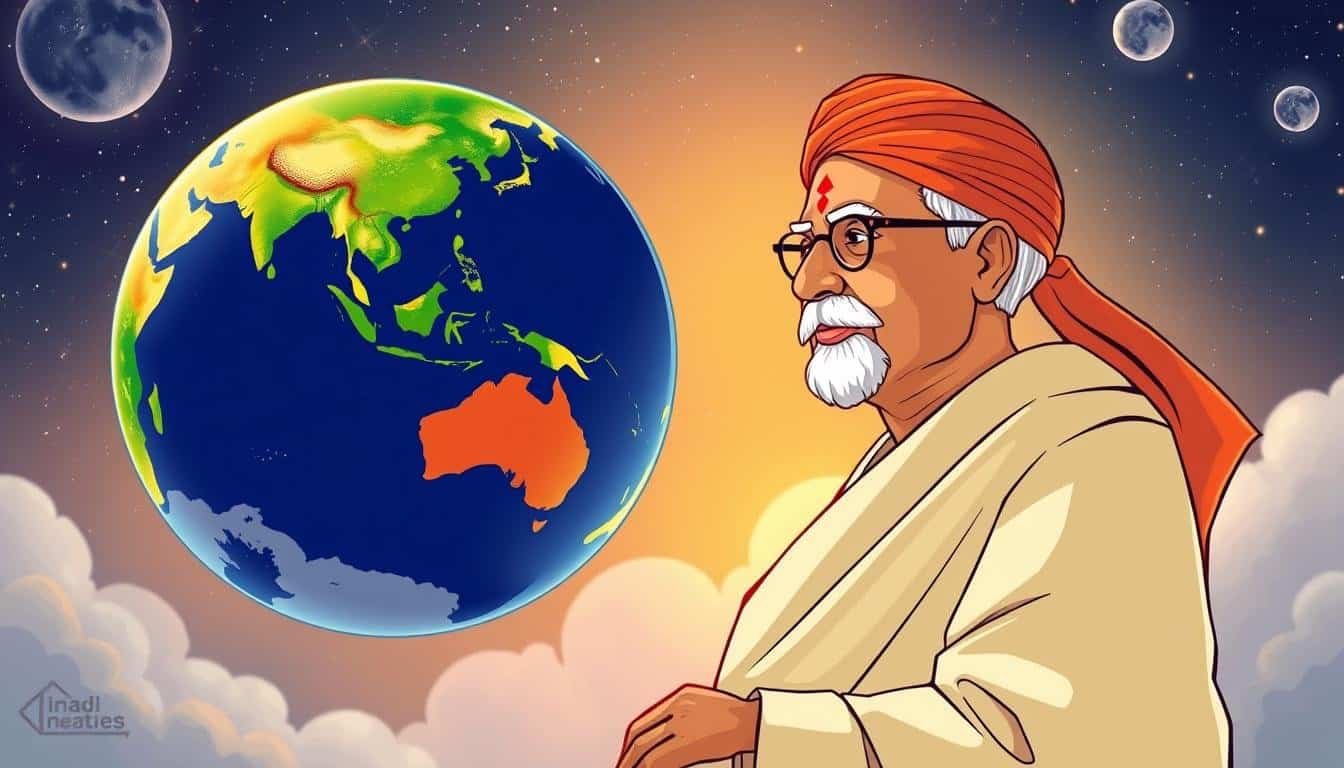Swami Vivekananda: Bridging Vedanta and the West
“Arise, awake, and stop not till the goal is reached.” These words by Swami Vivekananda inspire us to grow spiritually and personally. He was born in 1863 in Kolkata and became a key figure in linking Eastern spirituality with Western thought.
Vivekananda started his journey in Kolkata, a city full of culture and learning. His life changed when he met Sri Ramakrishna. This meeting led him on a path that changed religious discussions worldwide.
In 1893, Vivekananda made history at the World’s Parliament of Religions in Chicago. His speeches introduced Vedanta Philosophy to the West, sparking interest in Eastern wisdom. This event started a global movement that still shapes spiritual thought today.
Vivekananda’s teachings went beyond religion. They inspired leaders like Leo Tolstoy, Mahatma Gandhi, and even Barack Obama. His teachings on inner strength and helping others sparked a Hindu Renaissance that inspires millions globally.
Early Life and Spiritual Awakening of Swami Vivekananda
Swami Vivekananda was born Narendra Nath Datta in Kolkata on January 12, 1863. This was during the Hindu festival of Makarasamkranti, now celebrated as National Youth Day in his honor.
Birth and Childhood in Kolkata
Narendra Nath Datta was born into a wealthy Bengali family. His father, Viswanath, loved English and Persian literature. His mother, Bhuvaneswari Devi, was skilled in sewing and singing.
Young Narendra was full of energy and deeply connected to Hindu deities.
Encounter with Sri Ramakrishna
In November 1881, at 18, Narendra visited the Kali Temple in Dakshineswar. There, he met Sri Ramakrishna, starting a deep guru-disciple bond. This meeting began his journey to spiritual enlightenment.
Spiritual Crisis and Transformation
Narendra faced a spiritual crisis, doubting God’s existence. After Sri Ramakrishna’s death in 1886, he chose an ascetic life. He and other disciples started the Ramakrishna Math, a monastic order based on their guru’s teachings.
| Event | Date | Significance |
|---|---|---|
| Birth of Narendra Nath Datta | January 12, 1863 | Beginning of a spiritual journey |
| Meeting with Sri Ramakrishna | November 1881 | Start of guru-disciple relationship |
| Sri Ramakrishna’s passing | August 16, 1886 | Narendra’s embrace of ascetic life |
This transformation led to the birth of Swami Vivekananda. He became a spiritual leader, blending Eastern spirituality with Western rationality. He inspired millions worldwide.
Vivekananda’s Journey to the West
Swami Vivekananda’s trip to the West was a major turning point. It spread Vedanta philosophy far and wide. His journey started with a key event that changed spiritual talks between East and West.
Participation in the World’s Parliament of Religions
In August 1893, Vivekananda went to the World Parliament of Religions in Chicago. This event brought together religious leaders from all over the world. His being there changed him and his audience in big ways.
Impact of His Speeches in Chicago
Vivekananda’s talks at the Parliament made a big impact on Western seekers of spirituality. The New York Herald called him “undoubtedly the greatest figure in the Parliament of Religions.” His speeches mixed Eastern wisdom with Western thinking, winning over many hearts and minds.
Spreading Vedanta Philosophy in America and Europe
After the Parliament, Vivekananda spent almost three and a half years sharing Vedanta philosophy in the U.S. and Europe. He made New York City his home in 1896 and gained a strong following. He then published ‘Raja Yoga’, giving Westerners practical spiritual advice.
| Year | Event | Impact |
|---|---|---|
| 1893 | World Parliament of Religions | Established Vivekananda as a global spiritual leader |
| 1896 | Publication of ‘Raja Yoga’ | Introduced practical yogic concepts to Western readers |
| 1896-1897 | Lectures in Europe | Expanded Vedanta’s influence across the Atlantic |
Vivekananda’s success in the West set a standard for modern gurus and yogis in India. His work to share yogic ideas with more people, using modern views, still shapes spiritual talks today.
The New Vedanta: A Modern Interpretation
Swami Vivekananda changed spiritual thought with his new take on Advaita Vedanta. His ideas reached both Eastern and Western people, linking old wisdom with today’s needs.
Vivekananda made religion more scientific, drawing in thinkers and doubters. He used logic and facts to explain deep spiritual ideas, speaking to the minds of his time.
He taught about spiritual democracy, saying everyone is divine, no matter their background. This idea broke down old social barriers and pushed for personal spiritual growth.
“Each soul is potentially divine. The goal is to manifest this divinity within by controlling nature, external and internal.”
Vivekananda linked the physical and spiritual worlds, showing how we can connect with God. His teachings met the spiritual needs of his era and led to the creation of Vedanta centers around the globe.
| Aspect | Traditional Vedanta | New Vedanta |
|---|---|---|
| Approach | Philosophical | Scientific and Practical |
| Accessibility | Limited to scholars | Open to all seekers |
| Focus | Renunciation | Active engagement |
| Goal | Individual liberation | Universal harmony |
Even though some opposed him, Vivekananda’s ideas won out. His New Vedanta still motivates people everywhere, offering a new look at ancient truths that still matter today.
Swami Vivekananda: Bridging Vedanta and the West
Swami Vivekananda’s approach to Vedanta philosophy was groundbreaking. He introduced Eastern spirituality to a global audience. His teachings blended Eastern spirituality with Western rationality in a new way.
Synthesizing Eastern Spirituality with Western Rationality
Vivekananda’s Practical Vedanta aimed to bring spiritual ideals into everyday life. He showed that every person is divine and Spirit is everywhere. This made ancient wisdom relevant to modern minds shaped by technology.
His teachings sparked a Hindu Renaissance. It inspired people in India and around the world.
Promoting Interfaith Dialogue and Understanding
At the 1893 Parliament of the World’s Religions in Chicago, Vivekananda introduced Hinduism to the West. He spoke about the unity of all religions. This idea helped create a more inclusive and universal spirituality.
Influence on Western Intellectuals and Spiritual Seekers
Many Western thinkers were moved by Vivekananda’s ideas. Leo Tolstoy, William James, and Nikola Tesla were among them. His teachings are still inspiring people today.
His work, The Complete Works of Swami Vivekananda, is widely read. Vivekananda’s birthday is now celebrated as National Youth Day in India. This shows his lasting impact on society and spirituality.
“All the powers in the universe are already ours. It is we who have put our hands before our eyes and cry that it is dark.” – Swami Vivekananda
Establishing the Ramakrishna Mission
Swami Vivekananda returned to India in January 1897, changing the spiritual scene. He started the Ramakrishna Mission in Kolkata on May 1, 1897. This organization mixed monastic life with helping others, showing Vivekananda’s idea of Practical Vedanta.
The Ramakrishna Order was a group of monks focused on helping people. In early 1898, Vivekananda bought land in Belur for Belur Math. It became the main place for the Ramakrishna Math and Mission. This place was a guide for those seeking spirituality and a center for helping others.
The mission was different from other religious groups because it focused on helping the community. It helped in many ways, like:
- Education for poor kids
- Health care in hard-to-reach places
- Helping during natural disasters
This new way of living mixed old spiritual ideas with today’s needs. The Ramakrishna Mission made a big difference in India. It started programs to help the poor and encouraged its followers to serve others.
| Year | Milestone |
|---|---|
| 1897 | Founding of Ramakrishna Mission in Kolkata |
| 1898 | Establishment of Belur Math |
| Early 1900s | Expansion of education and healthcare initiatives |
The Ramakrishna Mission still motivates millions, showing Vivekananda’s dream of a caring and enlightened world.
Vivekananda’s Vision for India’s Spiritual Renaissance
Swami Vivekananda was born in 1863 in Kolkata. He wanted to bring a spiritual rebirth to India. His ideas led to a Hindu Renaissance and helped the Indian Independence Movement. He focused on fighting poverty, social issues, and educating the masses.
Addressing Poverty and Social Issues
Vivekananda saw the neglect of the poor as the main problem in India. He wanted to boost the confidence of the lowly and push for social change. In 1897, he started the Ramakrishna Mission to face these issues directly.
Empowering the Masses through Education
Education was key in Vivekananda’s plan. He believed in teaching everyone, no matter their social class. The Ramakrishna Mission opened schools, colleges, and hostels to achieve this. His idea that education empowers people struck a chord during the fight for India’s independence.
Revitalizing Hinduism and National Pride
Vivekananda wanted to make Hinduism strong and boost national pride by showing off India’s deep spiritual roots. He connected Indian and Western cultures, serving as a bridge between them. His teachings sparked a global interest in meditation and Pranayama, leading to a spiritual awakening.
| Year | Event | Impact |
|---|---|---|
| 1863 | Birth of Swami Vivekananda | Beginning of a new era in Indian spirituality |
| 1897 | Founding of Ramakrishna Mission | Establishment of hospitals, schools, and rural development centers |
| 1902 | Passing of Swami Vivekananda | Legacy of self-respect, self-reliance, and self-assertion for India |
The Living God: Vivekananda’s Concept of Service
Swami Vivekananda changed spiritual practice with his idea of the “living God.” He moved focus from a far-off deity to seeing the divine in everyone. His teachings were all about serving God by helping those in need, especially the poor.
Vivekananda mixed Practical Vedanta with Karma Yoga for a strong spiritual and social service blend. He saw helping others as a way to grow spiritually, not just a moral act. This idea led to the Ramakrishna Mission’s work.
Vivekananda’s message of love through Vedanta touched many lives. He spent four years in the United States sharing his teachings. His words reached both everyday people and thinkers, helping to solve religious and community issues.
“I have a message to the West just as Buddha had a message to the East.”
Vivekananda believed in personal freedom and thinking for oneself in spiritual growth. He said everyone is naturally divine, not inherently sinful. This idea motivated many to help others without expecting anything in return, seeing it as a sacred duty.
Legacy and Global Impact of Swami Vivekananda
Swami Vivekananda’s teachings have deeply influenced Modern Hinduism and sparked a Global Spiritual Movement. His impact is huge, even though he lived only 39 years. He left a lasting mark on India and the world.
Influence on Indian Independence Movement
Vivekananda’s ideas were key in India’s fight for freedom. Mahatma Gandhi visited Belur Math in 1921 and felt more love for India after reading Vivekananda’s works. Jawaharlal Nehru and Subhas Chandra Bose also saw a big impact on their generation.
Continuation of His Work Through Vedanta Centers
Vedanta Centers around the world keep alive Vivekananda’s message of universal spirituality and service. These centers work for interfaith understanding and spiritual unity, just as Vivekananda envisioned.
Relevance in Modern Times
Vivekananda’s teachings are still important today, tackling issues like religious tolerance and social justice. His birthday, January 12, is now National Youth Day in India. It honors his lasting effect on the nation’s youth and spiritual life.
| Aspect | Impact |
|---|---|
| Education | Established Indian Institute of Science |
| Spirituality | Founded Ramakrishna Mission |
| Global Influence | Inspired World Brotherhood Day |
Vivekananda’s philosophy of spiritual universalism motivates leaders and social activists globally. It promotes harmony and unity across different faiths. His rational approach to spirituality encourages questioning dogmas and seeking truth personally. This makes his teachings timeless and relevant to everyone.
Vivekananda’s Key Teachings and Quotes
Swami Vivekananda was a key figure who brought Vedanta Philosophy to the West. He was born in 1863 in Kolkata. He taught about self-realization and acceptance for everyone.
His speech at the 1893 World’s Parliament of Religions in Chicago made him famous worldwide. He talked about the importance of religious tolerance and unity.
Vivekananda believed every soul is divine. He said, “Each soul is potentially divine. The goal is to manifest this divinity within.” This idea inspired many to seek spiritual growth.
He also said, “Religion is not in books, nor in theories, nor in dogmas, nor in talking, not even in reasoning. It is being and becoming.” This shows his focus on living spirituality.
In 1897, Vivekananda started the Ramakrishna Mission. It aims to spread his teachings of service and spiritual growth. He believed in Karma Yoga, or doing things for others without expecting anything in return. This shows his belief in the divine nature of all beings.
Vivekananda’s quotes still guide people on their spiritual journey. They help connect Eastern wisdom with Western thinking. This leads to a better understanding of our common humanity.
Source Links
- Vedanta Center of Greater Austin – Swami Vivekananda
- Vedanta Centre – Adelaide
- Swami Vivekananda Biography : Early Life, Education, Works, Teachings and Famous Quotes
- BIOGRAPHY OF SWAMI VIVEKANANDA
- Swami Vivekananda Biography: Early Life, Education, Works, Teachings, and Famous Quotes
- Vivekananda’s journey
- New film depicting ‘hero’s journey’ of Swami Vivekananda comes to PBS
- A cognitive linguistic analysis in light of Conceptual Metaphor Theory
- New Film Depicting ‘Hero’s Journey’ of Swami Vivekananda Comes to PBS – Interfaith America
- Neo-vedanta movement – Vocab, Definition, and Must Know Facts | Fiveable
- Swami Vivekananda’s Practical Vedanta – American Vedantist
- Swami Vivekananda
- Introduction (Swami Vivekananda’s life and history) [Chapter 1.0]
- Swami Vivekananda and Practical Vedanta: – Ramakrishna Math, Pala
- Swami Vivekananda – the Spiritual Scientist
- Vivekananda’s vision: Religion and modernity
- Vivekananda’s Vedanta of Universal Love
- Swami Vivekananda’s Appeal for America – American Vedantist
- Influence and legacy of Swami Vivekananda
- Swami Vivekananda’s Spiritual Heirs Delve into his Legacy on 150th Birth Anniversary
- Interfaith Dialogue: Bridging Beliefs: Swami Vivekananda s Legacy in Interfaith Dialogue – FasterCapital
- Swami Vivekananda and His 1893 Speech | The Art Institute of Chicago
- Swami Vivekananda: Teachings & Philosophy






